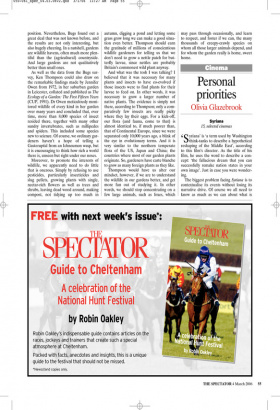Personal priorities
Olivia Glazebrook
Syriana
15, selected cinemas
‘Syriana’ is ‘a term used by Washington think-tanks to describe a hypothetical reshaping of the Middle East’, according to this film’s director. As the title of his film, he uses the word to describe a concept: ‘the fallacious dream that you can successfully remake nation states in your own image’. Just in case you were wondering.
The biggest problem facing Syriana is to contextualise its events without losing its narrative drive. Of course we all need to know as much as we can about what is going on between the Middle East and America, but this is a motion picture, not a presentation. Since we are well aware that there is no available solution to the monstrous issues at stake, what we require from the film is insight, via the stories with which we are presented. And that doesn’t just mean rushing from one continent to another in order to overhear another conversation between two men in suits.
Syriana is written and directed by Stephen Gaghan (who won an Oscar for his screenplay of Traffic), and executive produced by Steven Soderbergh (who won Best Picture, also with Traffic) so it is no surprise to see a narrative style similar to that of Traffic employed here. Our key players are Bob Barnes (George Clooney), a CIA agent who is promised a desk job after one last hit in Beirut; Prince Nasir (Alexander Siddig), heir to the throne of a nameless oil-producing country in the Persian Gulf; Bryan Woodman (Matt Damon), an American energy analyst whose life collides tragically with Nasir’s; Bennett Holiday (Jeffrey Wright), a Washington attorney whose job it is to investigate a merger between two American oil companies; and Wasim (Mazhar Munir), a Pakistani looking desperately for work in the oil fields of the Gulf.
As in Traffic, the film sets up each narrative strand and then hops from one to another. Naturally enough, each story is connected and is slowly advanced towards a ragged, desperate conclusion. But where Traffic seemed cohesive, Syriana as a whole seems fractured — the connections are forced. There are brilliant, gripping scenes but we lose impetus when we switch stories. Dialogue involves us, but information halts us.
As well as playing a part in the political drama, each character has a personal crisis waiting in the wings. Barnes has an estranged wife and a resentful son; Nasir must bargain with his fly, scheming brother for the throne; Woodman loses a son and abandons his wife for his work; Holiday’s father is a drunk, found slumped on his doorstep more often than not; and Wasim loses faith in his father, turning instead to the surrogate ‘family’ of a radical Islamic school. Circumstance may divide these characters, but stripped of circumstance their personal priorities are the same. This, too, recalls Traffic, in which each lead character had to abandon any stern moral position in order to salvage what mattered most: family.
So the film intends to show just how complex the Middle Eastern issues are, in case we didn’t know already. That suicide bombers are made and not born; that the CIA is a ruthless organisation which will turn its back rather than defend its own; that corruption thrives in every corner of the global oil industry; that opposition will be eliminated without warning. All very educational — you can see why actors clamoured to be involved.
But curiously, since each narrative could support its own film, Syriana is ultimately less great than the sum of its parts. Granted the briefest portion of screen time, tragic and powerful events lose their impact. It is difficult to maintain pace, crucial in a thriller such as this, when we keep tearing off to look at something else. Boldly attempting to represent everyone, Stephen Gaghan has sketched a landscape rather than painted a portrait.
Having been rather squashing, I must declare that I found Syriana intriguing and complex to watch, requiring all my attention for every moment. But it lacks a particular perspective, and a compelling pace. For the players the situation is overwhelming and ultimately uncontrollable — there is no time for examination. The news is all bad: whatever you do, greedy men in suits in Washington won’t take any notice, and nor will they lose out. One look at Christopher Plummer, calmly snipping at his roses in a spotless Panama hat, and you know he’ll still be in place at the end of the picture. For the men on the ground Barnes, Nasir, Wasim — there’s a different story. And for anyone who has seen Traffic, we have been here already. Bryan Woodman thinks he can help, he thinks he can do something, but it’s a million miles beyond him. So he gets the hell out and goes home to his wife. And that’s the end of the story.











































































 Previous page
Previous page